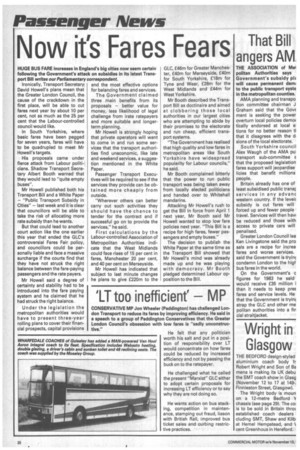Now it's Fares Fears ane AM
Page 14

If you've noticed an error in this article please click here to report it so we can fix it.
Tgharst Bill
HUGE BUS FARE increases in England's big cities now seem certain following the Government's attack on subsidies in its latest Transport Bill writes our Parliamentary correspondent.
Ironically, Transport Secretary David Howell's plans mean that the Greater London Council, the cause of the crackdown in the first place, will be able to cut fares next year by about 10 per cent, not as much as the 25 per cent that the Labour-controlled council would like.
In South Yorkshire, where basic fares have been pegged for seven years, fares will have to be quadrupled to meet Mr Howell's targets.
His proposals came under fierce attack from Labour politicians. Shadow Transport Secretary Albert Booth warned that they would lead to "quite empty buses".
Mr Howell published both his Transport Bill and a White Paper — "Public Transport Subsidy in Cities" — last week and it is clear that councillors will be able to take the risk of allocating more rate subsidy than he wants.
But that could lead to another court action like the one earlier this year that ended the GLC's controversial Fares Fair policy, and councillors could be personally liable and face a massive surcharge if the courts find that they have not struck the right balance between the fare-paying passengers and the rate payers.
Mr Howell said a degree of certainty and stability had to be introduced into the fare paying system and he claimed that he had struck the right balance.
Under the legislation the metropolitan authorities would have to present three-year rolling plans to cover their financial prospects, capital provisions and the most effective options for balancing fares and services.
The Government claimed• three main benefits from its proposals — better value for money, less likelihood of legal challenge from irate ratepayers and more suitable and longerterm planning.
Mr Howell is strongly hoping that private operators will want to come in and run some services that the transport authorities find uneconomic, like late and weekend services, a suggestion mentioned in the White Paper.
Passenger Transport Executives will be required to see if the services they provide can be obtained more cheaply from outside.
"Wherever others can better carry out such activities they should have the chance to tender for the contract and if successful go on to provide the services," he said.
First calculations by the Labour-controlled Association of Metropolitan Authorities indicate that the West Midlands could face rises of 15 per cent in fares, Manchester 20 per cent, and 40 per cent on Merseyside. • Mr Howell has indicated that subject to last minute changes he plans to give £220m to the G LC, £46m for Greater Manchester, £40m for Merseyside, £40m for South Yorkshire, £18m for Tyne and Wear, £28m for the West Midlands and £44m for West Yorkshire.
Mr Booth described the Transport Bill as doctinaire and aimed at clobbering those local authorities in our largest cities who are attempting to abide by their promises to the electorate and run cheap, efficient transport systems.
"The Government has realised that high quality and low fares in metropolitan areas like South Yorkshire have widespread popularity for Labour councils," he said.
Mr Booth complained bitterly that the power to run public transport was being taken away from locally elected politicians and handed over to Whitehall mandarins.
Attacking Mr Howell's rush to get the Bill in force from April 1 next year, Mr Booth said Mr Howell wanted to stop low fare policies next year. "This Bill is a recipe for high fares, fewer passengers and empty buses."
The decision to publish the White Paper at the same time as the Transport Bill showed that Mr Howell's mind was already made up and he was playing with democracy. Mr Booth pledged determined Labour opposition to the Bill.












































